
| myArmoury.com is now completely member-supported. Please contribute to our efforts with a donation. Your donations will go towards updating our site, modernizing it, and keeping it viable long-term.
Last 10 Donors: Piotr H. Feret, Graham Shearlaw, Anonymous, Daniel Sullivan, Chad Arnow, Jonathan Dean, M. Oroszlany, Sam Arwas, Barry C. Hutchins, Dan Kary (View All Donors) |
| Author |
Message |
|
Mike DePaola
|
 Posted: Wed 11 Mar, 2015 5:56 pm Post subject: Etching Metal at Home Posted: Wed 11 Mar, 2015 5:56 pm Post subject: Etching Metal at Home |
 |
|
|
Does anybody know a homemade method of inscribing writing on a stainless steel dagger or sword? I've looked up others online, but they usually involve a dangerous amount of electricity. Do I need a battery, cotton swab, and vinegar?
|
|
   |
 |
Glen S. Ramsay

Location: Mississauga, Ontario, Canada Joined: 10 Dec 2003
Posts: 91
|
|
  |
 |
Daniel Wallace

Location: Pennsylvania USA Joined: 07 Aug 2011
Posts: 580
|
 Posted: Wed 11 Mar, 2015 6:34 pm Post subject: Posted: Wed 11 Mar, 2015 6:34 pm Post subject: |
 |
|
no, you won't need to do all of that. adding an electrical current just helps speed up the reaction of the acid and metal by adding heat to it.
you can easily use a salt and vinegar mixture to make an etch, it will just take some time for the reaction to give you the desired depth you want.
ferric chloride (which you can get at radio shack) will also etch, and is highlighted by most hobbyists. its still a pretty mild acid when you buy it over the counter.
you can do some tests by using nail polish as your resist (it works just fine) and giving a test metal a dunk for a period of time to give you the desired depth. however, a deep etch can get sloppy if your image has a lot of fine detail, the acid will eat under the resist and undercut other section bleeding into places you don't want it.
|
|
  |
 |
Josh Davis
Industry Professional

Location: Minneapolis, MN Joined: 16 Oct 2011
Posts: 43
|
 Posted: Thu 12 Mar, 2015 7:56 am Post subject: Posted: Thu 12 Mar, 2015 7:56 am Post subject: |
 |
|
Hey Mike,
I just wanted to give you some pointers as I have just finished up an etching project recently.
I used ferric chloride acid and diluted it a bit as per suggestions from other blacksmiths. One little trick I used to get a deep etch without too much bleeding was that I did 30min dunks for a total of 5hrs. Each time in between I cleaned off the oxides with windex glass cleaner then rinsed it again with water and submerged it again.
Granted I have done this in a shop but I feel confident that you could do this within your home no problem, just be sure to use the proper holding tanks for the acid and such.
Here is the link to the post about the project I just finished up:
http://www.myArmoury.com/talk/viewtopic.php?t=31681
Let us know if you have any further questions,
Josh
www.davisreproductions.com
|
|
   |
 |
|
Jeffrey Faulk
|
 Posted: Thu 12 Mar, 2015 8:07 am Post subject: Posted: Thu 12 Mar, 2015 8:07 am Post subject: |
 |
|
|
Stronger acids such as muriatic acid for cleaning concrete will do the job much quicker... but the hazards are much higher (fumes, burns, etc). There may also be reactions with whatever you use to mask the metal. So I will strongly advise to use FeCl. It may be harder to find at Radio Shack as, well, that chain's closing down all over the place. May need to procure online or find an alternate supplier.
|
|
  |
 |
|
Peter Lyon
Industry Professional
|
 Posted: Thu 12 Mar, 2015 9:19 am Post subject: Posted: Thu 12 Mar, 2015 9:19 am Post subject: |
 |
|
I use Nitric acid a lot for steel etching, it is fast and clean, but a bit nasty to work with (fumes, bad for skin etc). Buying those little bottles from the electronics places is very expensive; I get it by the 20 liter drum. I don't know the cost, as I don't do the ordering myself, but it is likely about NZ$80 (US$65) or so for 20 liters.
Still hammering away
|
|
  |
 |
Jesse Belsky
Industry Professional

|
 Posted: Thu 12 Mar, 2015 8:12 pm Post subject: Posted: Thu 12 Mar, 2015 8:12 pm Post subject: |
 |
|
I do all my etching with salt water and a car battery charger. You can find instructions in various places on the internet...search for "salt water electrochemical etching" or similar. It's super simple, and requires no toxic chemicals. You can also do it with lesser power sources like 9 or 12 volt batteries. It does produce dangerous fumes (although in very small quantities), so its best to do it in a well ventilated area.
I find it's much faster and easier to control than acid etching, and you can do it very selectively with a wet q-tip for very small areas (perfect for makers marks and such)--so you don't have to mask the whole blade to etch a small section. It provides a nice clean cut and its easy to stop at any time to check the depth of the cut.
[EDIT: I wanted to clarify...i've actually never etched with Nitric Acid, only Ferric Chloride. So Nitric may be faster than electrochemical etching, but of course you have to handle and dispose of the acid]
Here are a few examples, done with all different kinds of resists...arcylic paint, adhesive vinyl, laser jet toner transfer, etc.
 Attachment: 83.5 KB Attachment: 83.5 KB
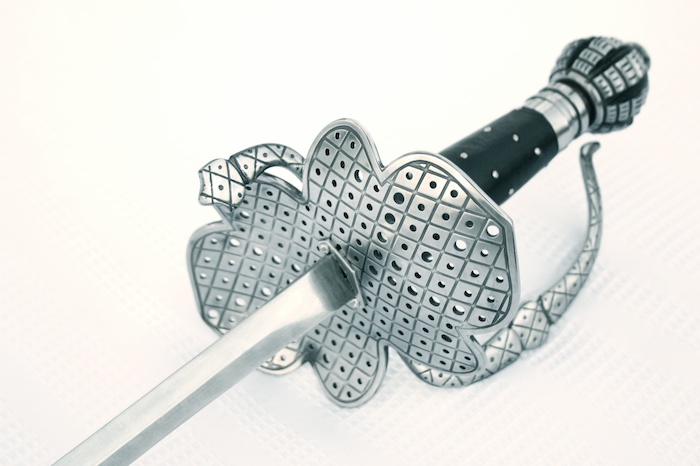
 Attachment: 104.27 KB Attachment: 104.27 KB
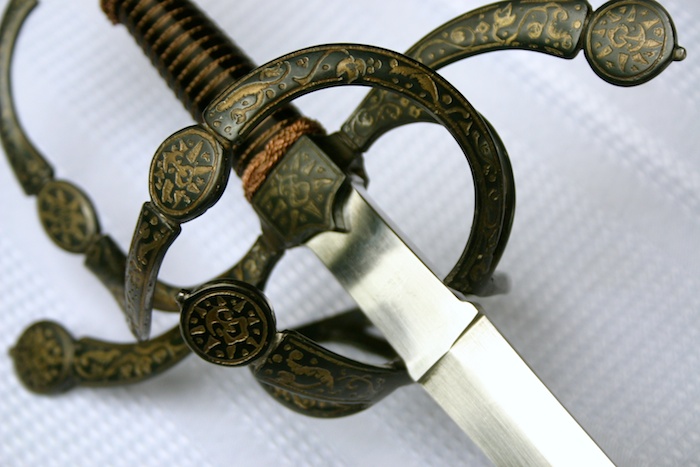
 Attachment: 104.29 KB Attachment: 104.29 KB
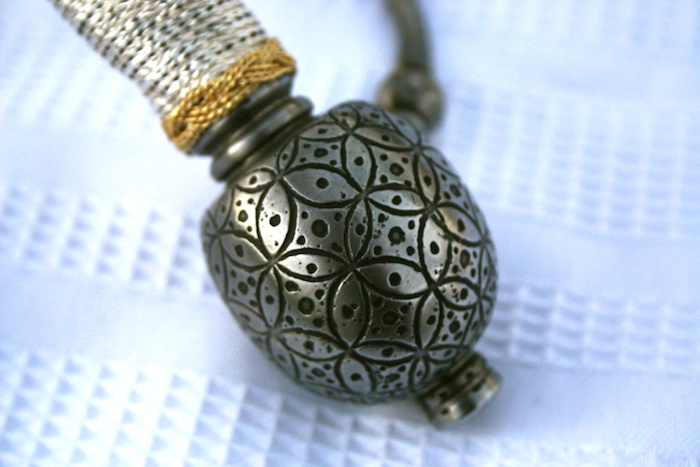
 Attachment: 130.01 KB Attachment: 130.01 KB
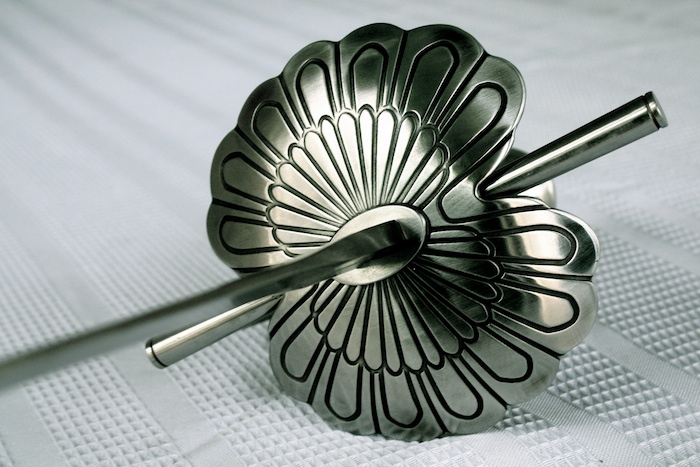
 Attachment: 136.97 KB Attachment: 136.97 KB
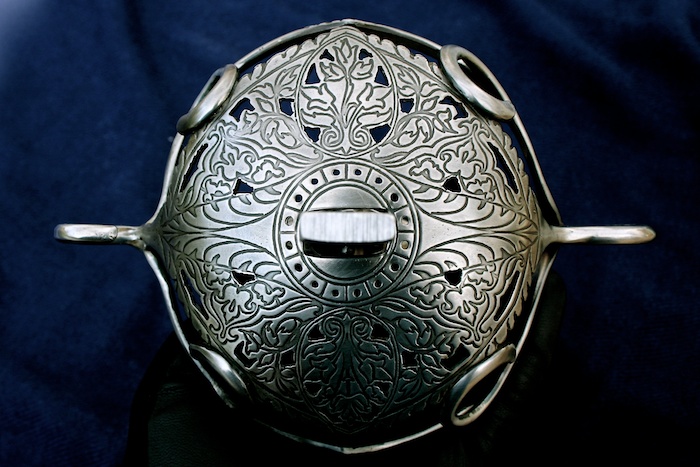
 Attachment: 133.12 KB Attachment: 133.12 KB
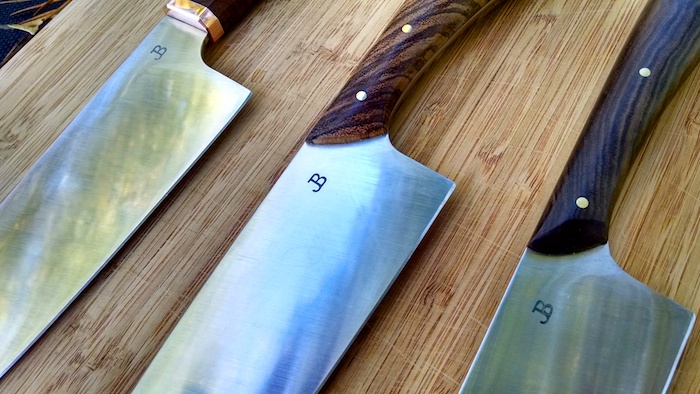
Last edited by Jesse Belsky on Sat 14 Mar, 2015 5:01 am; edited 1 time in total
|
|
   |
 |
Harry Marinakis

|
 Posted: Sat 14 Mar, 2015 3:53 am Post subject: Posted: Sat 14 Mar, 2015 3:53 am Post subject: |
 |
|
|
Thanks!
|
|
  |
 |
|
Mark Griffin
Location: The Welsh Marches, in the hills above Newtown, Powys. Joined: 28 Dec 2006
Posts: 802
|
 Posted: Sat 14 Mar, 2015 7:00 am Post subject: Posted: Sat 14 Mar, 2015 7:00 am Post subject: |
 |
|
As Jeffrey says, H&S is important with this kind of thing. Before you go off buying vats of acids etc, get gloves, apron, goggles and mask. You can get new raw material but lung linings and other easily dissolved and irritated organic bits are a bit more difficult.
Any thing that is visually reacting is undoubtedly reacting invisibly as well. Happy etching!
Currently working on projects ranging from Elizabethan pageants to a WW1 Tank, Victorian fairgrounds 1066 events and more. Oh and we joust loads!.. We run over 250 events for English Heritage each year plus many others for Historic Royal Palaces, Historic Scotland, the National Trust and more. If you live in the UK and are interested in working for us just drop us a line with a cv.
|
|
  |
 |
|
|
You cannot post new topics in this forum
You cannot reply to topics in this forum
You cannot edit your posts in this forum
You cannot delete your posts in this forum
You cannot vote in polls in this forum
You cannot attach files in this forum
You can download files in this forum
|
All contents © Copyright 2003-2026 myArmoury.com — All rights reserved
Discussion forums powered by phpBB © The phpBB Group
Switch to the Basic Low-bandwidth Version of the forum
|

